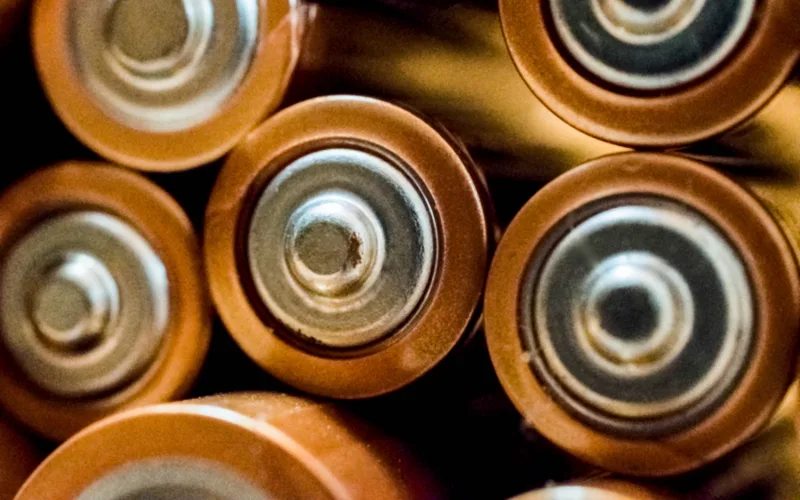Last Updated on May 9, 2024 by Ecologica Life
In the 21st century, the modern world depends on batteries. From our phones and laptops to children’s toys. Batteries underpin essential services, ensuring that hospitals and trains keep running even when the mains electricity is down. They are indispensable.
In this article we will explore what batteries are, how they are recycled, and how EU legislation is helping to protect the environment.
Table of Contents
How Do Batteries Work?
Batteries work by converting chemical energy into electrical energy. When the anode (positively charged end) and the cathode (negatively charged end) of a battery are connected in a circuit, the chemical reactions inside the battery produce an electric current. These reactions are caused by the movement of electrons between the positive and negative electrodes of the battery.
Can You Put Batteries in the Bin?
Batteries contain chemicals such as cadmium, lead, mercury, nickel, and lithium which can be toxic to humans and wildlife if not disposed of properly.
Battery Pollution
When batteries are not recycled, i.e. thrown away with household waste, they end up in landfills. As the battery casing corrodes, chemicals leach into the water and soil and end up in our water supply. When this water ends up in ponds or lakes, it can ruin entire ecosystems.
Are Landfills Still Overflowing in 2024?

The lithium in batteries can cause fires in landfills that burn underground for years. These fires release toxic substances into the atmosphere, further polluting the already polluted air that people and wildlife breathe. Nice!
Guide to the Air Pollution Crisis
Batteries and Human Health
Batteries can contain harmful chemicals such as:
- Cadmium and Nickel: Carcinogenic (cancer-causing).
- Lead: Linked to birth defects and neurological damage.
- Mercury: Highly toxic in vapour form. For this reason, it has been banned from use in batteries in many countries.
While batteries pose little risk when intact, leaking chemicals are highly toxic to people and the environment.
How Can I Recycle My Batteries?
In many parts of the world, such as Europe and North America, recycling bins are available in supermarkets. Stores that sell batteries must provide a container for recycling. If not, your local recycling centres should be able to recycle batteries.
Door-to-door collection services are available in some regions. Search online for the nearest recycling container and available options.
Types of Batteries and Their Uses
Batteries can be broadly divided into primary (non-rechargeable) and secondary (rechargeable) types.
Primary batteries, such as alkaline and lithium batteries, are commonly used in household items such as remote controls, cameras, and flashlights due to their long shelf life and reliability.
Secondary batteries, including nickel-cadmium (NiCd), nickel-metal hydride (NiMH), and lithium-ion (Li-ion), are favoured for their reusability. They are widely used in portable electronics, power tools, electric cars, and renewable energy storage systems.
How are Batteries Recycled?
The type of battery affects how it is recycled. Lead-acid type batteries are used in cars. These are broken up; the sulphuric acid is drained off and then the lead and plastic are separated in a water bath. The acid is converted into industrial chemicals or water, while the lead and plastic are melted down to make new batteries.
Similar processes are used to extract and reuse the steel, manganese, zinc, and other components from alkaline batteries.
Lithium-ion (fast-charging) batteries are difficult to recycle because lithium is a highly reactive element. They are recycled by specialists trained to work with high voltage. They use insulated tools to avoid electrocution or short-circuiting the pack.
Are Rechargeable Batteries Worth It?
Rechargeable batteries are more environmentally friendly than their non-rechargeable cousins, as long as they are recharged many times before being thrown away. In some cases, such as smoke alarms, it makes more sense to use non-rechargeable batteries. Whatever you choose, the most important thing is to dispose of them properly.
In 2021, 48% of portable batteries sold in the EU were collected for recycling. Out of 242,000 tonnes of portable batteries, this is 108,000 tonnes of batteries per year. This is a significant improvement on previous years, but still needs to be much improvement!
Graph source: Eurostat. If the graph above doesn’t load, reload the page.
EU Legislation on Batteries
In the EU, there is the Batteries Directive of 2006. This directive aims to minimise the negative impact of batteries on the environment by regulating their composition, collection, recycling, and disposal.
The Directive requires Member States to set up systems for the collection and recycling of batteries. It also sets targets for recycling efficiency and restricts the use of hazardous substances such as mercury and cadmium in batteries.
It also requires manufacturers to take responsibility for the entire lifecycle of their products, promoting the design of more sustainable batteries and ensuring that end-of-life batteries are properly recycled to reduce pollution and conserve resources.
The Bottom Line
Batteries can be very polluting because of the chemicals they contain. Fortunately, the EU has legislation regulating these chemicals as well as the collection, recycling, and disposal of batteries. You can play part by disposing of batteries properly and not throwing them in the bin.
Let us know what you are doing to be more sustainable today in the comments.








